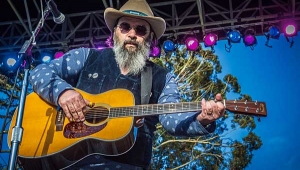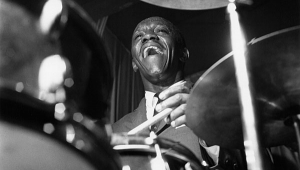| Columns Retired Columns & Blogs |
The Fifth Element #9
I don't know who originated the idea of "desert island" recordings. I do know that for many years there was a BBC radio program in the UK that asked celebrities to list their choices. While reading quite a few of those lists, I had the sneaking suspicion that the respondents either hadn't entered fully into the spirit of the task, or were tailoring their choices with a view to what the radio or reading audience would think. (Interior monologue: "I am an anorak-wearing viola da gamba player. Hmmm. Birth of the Cool had better be on my list. London Calling, too, just to be safe.")
Footnote 1: Desert in this sense refers to the island's being deserted, no matter how lush and green it might be. When I visualize a desert island, it is always Nikumaroro, in the South Pacific. The International Group for Historical Aircraft Recovery has made a compelling circumstantial case that Amelia Earhart and her navigator, Fred Noonan, perished there of thirst after running out of fuel and surviving a crash landing. Requiem aeternam dona eis, Domine.
If you really are on a desert island, you're alone there (footnote 1). If you give the matter serious as well as holistic thought, you may conclude (as I have) that the kind of recordings you would choose to listen to during a time of enforced solitude will be different from those you use to evaluate equipment, or those you revere as having advanced the musical arts. And let us leave aside for the moment the question of how long your battery-powered music system would keep playing (footnote 2).
In previous columns I have discussed many of the recordings I regularly use to evaluate equipment. In the future, I may make recommendations of recordings I think are the most artistically or culturally significant. But for now, I want to tell you about the recordings I would bring with me to that deserted place. What is called for is a combination of consolation and encouragement.
Each of these recordings thoroughly deserves your investigation and, in some cases, the expenditure of time and effort to meet the music halfway. As always, your local public library is the place to begin exploring—unless, of course, you actually are on a desert island. In that case, perhaps blackberry.net, amazon.com, and FedEx can help.
Despite the fact that I have spent most of my life involved with classical music for strings, my first choice features jazz trumpeter Clifford Brown. But we split the difference, because the album is Clifford Brown with Strings. Brown phrased ballads and torch songs the way David Oistrakh phrased Shostakovich's most soul-baring utterances. No higher praise is possible from me.
Almost as bittersweet—but definitely moving uptempo—is Miles Davis' Porgy and Bess collaboration with orchestrator Gil Evans. That Porgy and Bess has always been a distant also-ran to Davis' two or three household-word (and, dare I say, a bit overrated?) albums remains a bafflement. Trivia buffs note: The Porgy and Bess horn section includes the young Gunther Schuller.
Super-mellow jazz-guitar great Jim Hall's legendary Concierto has been reissued in luscious sound with generous alternate takes and additional tunes. As far as I know, Concierto was Hall's only collaboration with trumpet and sax icons Chet Baker and Paul Desmond, and their contributions are, predictably, treasurably memorable. Burn me at the stake if you must, but I prefer Jim Hall & Co.'s take on the tune from Rodrigo's guitar concerto to the one on Miles Davis' Sketches of Spain.
Speaking of guitarists, the fruitless-to-attempt-to-categorize Bill Frisell's cornucopia of Americana, Have a Little Faith, is a must-have, particularly for its Mex-Tex/surf-music cover of Stephen Foster's "Little Jenny Dow." Crank it up!
The Tallis Scholars' Heinrich Isaac: Missa de Apostolis would be my choice for a polyphonic Mass—though you can't go wrong with any of the Scholars' Byrd, White, Tallis, or Palestrina discs. Lou Harrison's La Koro Sutro is on almost the same spiritual plane. As a present for yourself or your family, why not obtain La Koro Sutro and a few Tallis Scholars discs? The contrasts will be illuminating.
To get myself over the inevitable low spots, The King's Singers' massively silly Gilbert & Sullivan program, Here's a Howdy-Do, is just what the doctor ordered. And if that doesn't work, there's always Monty Python's Contractual Obligation Album and Matching Tie and Handkerchief. Francomente, Scarlotta, if you're stuck alone in the middle of nowhere, Monty Python might save your sanity if Clifford and Miles can't...
Just about anything—symphonic, solo, or chamber—of Elgar, Vaughan Williams, or Delius, conducted by Boult or Barbirolli, would be welcome. Mahler's nearly unrelentingly tragic Symphony 6, in the Glenn Cortese-led Jerry Bruck recording (Stereophile's "Recording of the Month" for August 2000) would be good for the occasional wallow, as would the Joe Wheeler completion of Mahler's unfinished Symphony 10, with Robert Olson and the Colorado Mahler Festival Orchestra. And as long as I'm wallowing, there's always Elvis Costello's smolderingly angry All This Useless Beauty.
Footnote 1: Desert in this sense refers to the island's being deserted, no matter how lush and green it might be. When I visualize a desert island, it is always Nikumaroro, in the South Pacific. The International Group for Historical Aircraft Recovery has made a compelling circumstantial case that Amelia Earhart and her navigator, Fred Noonan, perished there of thirst after running out of fuel and surviving a crash landing. Requiem aeternam dona eis, Domine.
Footnote 2: Gontran de Poncis' gripping adventure memoir, Kabloona, tells of his having been the last white man to meet Eskimos who had never before met a white man. One of the most haunting images in the book is of an encampment de Poncis passed on his way North, where a retarded Eskimo youth amused himself all day with a wind-up Victrola, but only one record.
- Log in or register to post comments



































